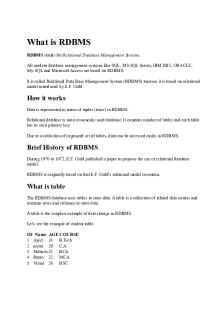Relational Turbulence Theory PDF

| Title | Relational Turbulence Theory |
|---|---|
| Author | Kaylie Vladislav |
| Course | Communication in Personal Relationships |
| Institution | University of Illinois at Urbana-Champaign |
| Pages | 2 |
| File Size | 76.5 KB |
| File Type | |
| Total Downloads | 6 |
| Total Views | 159 |
Summary
Download Relational Turbulence Theory PDF
Description
Lesson 1: Relational Turbulence Theory Relational Turbulence Theory Developed by Dr. Denise Solomon at the University of Wisconsin at Madison There are two versions o Relational Turbulence Model: Crafted in 2001 and 2004 o Relational Turbulence Theory Finalized in 2016 Fundamental Assumptions Transitions are pivotal moments Communication during times of transition can lead to relationship growth or decay Two Mechanisms 1. Relational Uncertainty o Definition: how sure are unsure people are about the nature of their relationship o Stems from: Self-Uncertainty: uncertainty that I have about my perceptions of a relationship Partner-Uncertainty: uncertainty about my partner’s perceptions of a relationship Relationship- Uncertainty: uncertainty about the status of the relationship itself o When people are experiencing relational uncertainty, they don’t know how to process incoming messages 2. Features of Interdependence o Three Features: Influence: when we let people into our lives, we give them some influence over our everyday routines As we mesh, we are bound to have interruptions Interference: when partners have the capacity to influence our routines, and they interrupt our routine in disruptive ways Happens when partners make it harder for us to accomplish our goals Facilitation: when partners have the capacity to influence our routines, and they interrupt our routine in positive ways Happens when partners make it easier for us to accomplish our goals Specific Episodes Marked by reactive in cognitions, emotions, and communication Crystalize over time
Relational Turbulence Definition: persistent sense of the relationship as chaotic Affects outcomes: o Social support o Conflict management o Ability to make plans o Ability to negotiate boundaries Evaluation Strengths: o Validity o Heuristic value
Weaknesses: o New o Scope Focuses solely on romantic relationships...
Similar Free PDFs

Relational Turbulence Theory
- 2 Pages

M11-11 Turbulence Products
- 14 Pages

WEAX 363 - Turbulence 3
- 3 Pages

Relational Communication
- 11 Pages

Relational dialectics
- 23 Pages

Relational Development Challenges
- 10 Pages

Rdbms - relational databases
- 4 Pages

Relational Aesthetics Summary
- 2 Pages

L7 - Relational Algebra
- 4 Pages

Chapter 4 Relational Databases
- 40 Pages
Popular Institutions
- Tinajero National High School - Annex
- Politeknik Caltex Riau
- Yokohama City University
- SGT University
- University of Al-Qadisiyah
- Divine Word College of Vigan
- Techniek College Rotterdam
- Universidade de Santiago
- Universiti Teknologi MARA Cawangan Johor Kampus Pasir Gudang
- Poltekkes Kemenkes Yogyakarta
- Baguio City National High School
- Colegio san marcos
- preparatoria uno
- Centro de Bachillerato Tecnológico Industrial y de Servicios No. 107
- Dalian Maritime University
- Quang Trung Secondary School
- Colegio Tecnológico en Informática
- Corporación Regional de Educación Superior
- Grupo CEDVA
- Dar Al Uloom University
- Centro de Estudios Preuniversitarios de la Universidad Nacional de Ingeniería
- 上智大学
- Aakash International School, Nuna Majara
- San Felipe Neri Catholic School
- Kang Chiao International School - New Taipei City
- Misamis Occidental National High School
- Institución Educativa Escuela Normal Juan Ladrilleros
- Kolehiyo ng Pantukan
- Batanes State College
- Instituto Continental
- Sekolah Menengah Kejuruan Kesehatan Kaltara (Tarakan)
- Colegio de La Inmaculada Concepcion - Cebu





